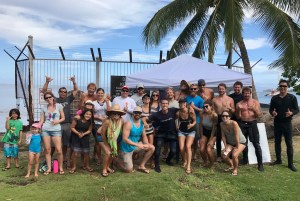Maui Coral Reefs: 7 Ways to Help
![Maui Coral Reef at Airport Beach Dive Site Maui coral reef in clear water at the Airport Beach dive site.]()
Corals Need You
It is no secret that coral reefs are vanishing at an alarming rate. Worldwide, coral reefs only cover 0.015 percent of the ocean floor—roughly the size of France! Despite occupying a minuscule fraction of the seafloor, coral reefs support 25 percent of all marine life.
Imagine 2 billion people relying on the landmass of France for survival! Indeed, coral reefs provide critical economic resources and food for animals. Coral reefs also protect coastlines from catastrophic weather events!
Several predictions exist regarding when coral reefs worldwide may experience their final collapse. National Geographic estimates that most coral reefs could collapse by 2100, warning that this could happen even sooner if humanity does not significantly reduce carbon emissions. Rising ocean temperatures due to climate change, sea-level rise, and slow geopolitical responses make it crucial for dedicated individuals to work towards preserving what remains of these vital ecosystems, often called the rainforests of the sea.
Current Coral Coverage in West Maui
For the sake of scope, let’s focus on the current state of Maui’s coral reefs. We will then highlight conservation efforts for the coral reef ecosystem and what individuals can do to mitigate the rapid changes affecting our reefs. According to ancient Hawaiian lore, the history of all life evolved from the coral polyp. Tiny coral polyps are the base organisms of an entire coral reef system, meaning Hawaiians have consistently recognized how vital corals are to the health of life on the planet.
Today, Hawaiian coral reefs are subject to various stressors. In particular, coral reefs in Lahaina, Maui, are declining due to multiple significant stressors: bleaching from rising ocean temperatures, sedimentation from coastal development, algal overgrowth from agricultural and waste runoff, fishing, and tourism. As a result, the Department of Land and Natural Resources estimates that Maui lost a quarter of its coral reefs between 1999 and 2006.
Popular Maui diving and snorkeling sites, such as Airport Beach in Kaanapali, experienced a 33 percent decrease in coral cover from 1995 to 2012. The coral reefs of West Maui’s famous Honolua Bay dropped a staggering 76 percent between 1995 and 2012!
Maalaea Bay in central Maui was the first example of a total coral reef collapse. The bay transformed from a healthy, diverse coral reef ecosystem to a degraded underwater desert in just a few decades. Fast-forward ten years, and we now see more coral reefs declining.
What will it take to save this valuable resource in the face of a growing island population? In 2002, the U.S. government estimated the value of coastal Hawaiian coral reefs at nearly $10 billion, with an average annual contribution of $364 million (Cesar and Beukering, 2004). This figure is likely much higher now, especially for Maui. Approximately 85 percent of this annual revenue is generated by tourism. However, fishing and surfing activities will follow suit if the reefs disappear. The loss of revenue on this scale would be catastrophic for the Maui economy and would cause permanent damage to the island’s best surf spots.
Ocean Conservation in Hawaii
The prognosis for Hawaii and the rest of the world appears bleak; however, people are fighting against human impacts on the marine environment.
- Following the coral bleaching events of 2014 and 2015, four conservation agencies in Hawaii and on the mainland established a network of permanent, no-take marine protected areas. They also helped fund the management of herbivorous fisheries. We can combat algae overgrowth by limiting the number of herbivores removed from shallow reefs, such as parrotfish. Herbivores consume algae, thereby preventing excessive growth. However, excessive algal growth inhibits coral reproduction, particularly following bleaching events.
|
- The National Oceanic and Atmospheric Administration (NOAA) recently awarded more than $1.3 million to the Joint Institute for Marine Atmospheric Research (JIMAR) at the University of Hawaii, Manoa, to support ongoing research on critical marine species in the Pacific Ocean.
|
- The Maui County Council is considering a bill to ban the sale of sunscreens containing Oxybenzone. According to the Hawaiian Department of Health, compelling studies by local and national coral experts have shown that elevated levels of this chemical in the environment can increase coral damage and susceptibility to bleaching. This bill was enacted and went into effect in January 2021.
|
- Robert Wintner, a longtime business owner of Snorkel Bobs on Maui, formed a political action committee called REEFPAC. This SuperPAC seeks to address corruption and weaknesses in the management of Reef State Policy. REEFPAC is also pushing to end fish removal from the Hawaiian Islands for the aquarium trade.
|
- Banyan Tree Divers Maui raises awareness of human impact on Maui’s delicate coral reefs by hosting annual land and underwater cleanups that remove hundreds of pounds of debris from the local ocean. Our Maui dive shop advocates the use of reef-safe sunscreen (free of Oxybenzone) that is not harmful to coastal Hawaiian waters. In addition, we donate money and time to reef conservation organizations, including Coral Reef Alliance, Malama Maui Nui, Sea Shepherd, and The Leonardo DiCaprio Foundation.
|
7 Ways You Can Help Coral Reefs?
As terrestrial species, humans are easily disconnected from the ocean environment and forget how essential it is to our existence on this planet. But you do not have to live near the ocean to protect it! If the collapse of coral reefs scares you, here is how you, as an individual, can help:
1. Get educated about the effects of climate change on coral reefs!
An excellent way to do this is to watch the powerful Netflix documentary Chasing Coral, download the Chasing Coral social media toolbox, and share it with everyone you can.
2. Limit your consumption of PLASTIC, FISH, and MEAT
You can find important information on this topic by listening to the Eat for the Planet podcast. Search for an interview with Sea Shepherd founder Captain Paul Watson.
3. Host beach cleanups if you live by the ocean
Involvement in your local community is a no-brainer!
4. Donate to foundations for coral research, action, and legislation
Follow these foundations on social media and research their positions. Unfortunately, some promote ocean conservation yet have seafood recipes on their websites!
Reputable Foundations Include:
5. Vote with your money
Don’t want to donate your hard-earned dough to science and conservation efforts. No problem! You can buy products that support sustainable oceans.
Examples include:
| Waterlust – “A purpose-driven brand that creates media inspiration and sustainable products to support marine science research and education.” |
| Manakai Swimwear – Eco-conscious swimwear made from repurposed nylon and discarded fishing nets. |
| Norton Point—Founded in 2016, this eyewear company offers the world’s first line of sunglasses made from post-consumer ocean plastics. For every product purchased, they remove one pound of ocean debris and donate proceeds to the Ocean Conservancy. |
| Raw Love Sunscreen – Maui-made, reef-friendly, 100 percent natural, 35 SPF. Apply often! |
6. Stay up to date with legislation
Senator Corey Booker (D-NJ), Shelley Moore Capito (R-WV), and three members of the House of Representatives introduced the bipartisan Shark Fin Elimination Act of 2017. Please call your local Senators and Representatives to support the passage of future legislation like this.
7. Volunteer your time, participate in citizen science

Citizen science is rapidly gaining traction as a method for everyday people like you and me to contribute to marine scientific research. Scuba divers, snorkelers, and water enthusiasts are encouraged to record and report unhealthy coral sitings such as bleaching, algae overgrowth, and disease.
Citizen Science Projects Include:
| Earthdive is a novel citizen science concept and a global research project that engages millions of recreational scuba divers, snorkelers, and others to help preserve the health and diversity of the oceans. |
| Project AWARE focuses on critical issues and empowers thousands of divers in more than 182 countries to work together for a clean, healthy, and abundant ocean planet. |
| ReefQuest—Founded by Dylan Vecchione at 18, ReefQuest is a nonprofit project that provides children with sufficient education and tools to become marine environmental stewards. It truly fosters marine ecological stewardship through citizen science. |
Final Thought
Maui’s coral reef provides habitat for our preferred marine animals, so we should afford it strict protection. If you found any of this information enlightening or helpful, please SHARE our blog, talk about helping corals with friends, call your mom to tell her how much you want to save coral reefs, be creative, and put your passion into action!
|
|


